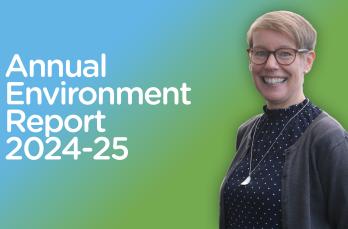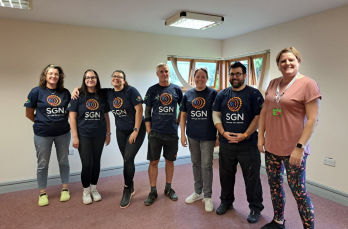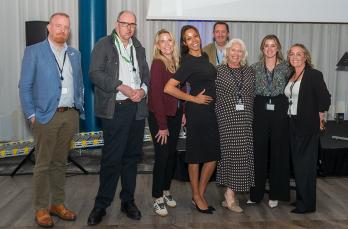
As part of Black History Month, colleagues from our Race Equality Network are sharing their personal experiences to help increase understanding across SGN and the network areas we work.
Dayle Thomas, Escape, Locate and Repair Team Leader based in Oxford has shared his story.
I’m a Black man in a predominantly white workforce. I’m a father of five, a dedicated partner, and someone who’s spent years relentlessly building a better life. I’m also a critical thinker, a professional, and a man whose mind is as sharp as any in the boardroom, given the chance.
But every single day, before I open my mouth to greet a colleague, talk to a customer, or present an idea, I perform a subtle, exhausting, and essential act of self-censorship. I engage in the unseen labour of code-switching.
It starts in the car park, before I walk in to the depot. I’m mentally preparing the voice that is ‘acceptable’ for the office – a voice that feels like a stranger’s suit I have to slip into. It’s a deliberate, calculated effort to flatten my vowels, soften my cadence, and consciously delete the linguistic markers of my truth. The truth is, I grew up in south London. My roots run deep in an environment that was often chaotic, challenging, and raw.
My accent is the soundtrack of my life. It’s the voice that told jokes with my friends on the estate. It’s the voice that learned to survive. It’s the voice that cooed to my newborn children. It’s the voice that says, “innit,” without a second thought, because that little word, for all its casualness, is an affirmation of shared understanding, of community.
But in this professional space, that one little word is a red flag, a flashing sign, a signal that I need to edit.
That’s where the struggle lies. When I use my natural voice – the one that connects me to my people, my past, and my culture – I’ve experienced the immediate, palpable downshift in perceived intelligence. I’ve seen the flicker of surprise, sometimes condescension, in someone’s eyes when a well-articulated, complex thought comes out with a South London ‘twang.’ My intelligence is routinely underestimated, my critical thinking abilities automatically questioned, all because of the rhythm of my speech.
For many in the majority culture, this accent is immediately tethered to a narrow, negative stereotype: ‘gang culture,’ criminality, a lack of education. What they don’t see, what they refuse to acknowledge, is the man behind the sound.
The life I left behind, the shadow I carry
My journey to this position, this career, and this life of stability was anything but smooth. I didn’t come from privilege. I came from struggle. I spent time in foster care homes, from the shadow of a mother battling mental health issues, drug use, and alcoholism. I know the inside of a prison cell. I know what it’s like to live on the edge, to be immersed in the crime and chaos that was, for a long time, my survival mechanism.
I have spent years dismantling that old self, piece by painful piece. I fought for my redemption, for my family, and for the chance to be a truly good man, a critical thinker, a provider, a caregiver. That battle took grit, resilience, and a profound, fundamental change of character. Yet, none of that effort seems to matter as much as the three seconds it takes for me to say, “Can we circle back on that point?” with a certain inflection. The shadow of those stereotypes is longer and darker than the light of my achievement.
The irony is not lost on me: my ability to navigate and survive a profoundly difficult past is what actually makes me an incredibly valuable employee. I have a perspective on risk, strategy, and resilience that is forged in the fire of real-life adversity. But to be heard, I have to erase the sound of that forging.
The cost of the switch
For those who may be reading this and thinking, “Code-switching? What’s that?” it is the act of adjusting one’s style of speech, appearance, behaviour, and expression in different contexts. For Black professionals like me, it is the constant, conscious process of performing cultural assimilation to ensure comfort, respect, and, ultimately, success in a white-dominated space.
And it is exhausting.
It’s the daily psychological tax of editing your natural self. It’s being unable to relax your mouth muscles, lest a sound slips out that reveals too much of your truth. It’s not just a switch of vocabulary, which is sometimes a simple professional necessity for all people, but a fundamental change of voice. It’s a disconnect from the core of who I am.
My accent is not a sign of deficit; it is a sign of origin. It is the music of a culture, a community, and a journey. It represents where I’m from, not who I am.
Difference doesn’t mean distant
I stand here, a testament to change and resilience, and I refuse to let the world believe that my background is a weakness. My ‘twang’ is part of my culture, and I am proud of the journey that it points to.
My professional life is about bridging gaps, solving problems, and connecting with people. And it’s time the professional world did the same. We need to be able to celebrate our differences. We need to educate ourselves beyond the tired, lazy stereotypes that reduce a complex human being to a problematic sound.
The truth is, underneath the layers of accent, postcode, and profession, we share so many fundamental human similarities: the want, need and desire to provide, the drive to create, the need for respect. We should celebrate these commonalities. But at the same time, let us learn about our differences, our different sounds, and see them not as barriers, but as bridges. A path to enlightening conversations.
For me, the goal isn’t to be allowed to speak in the office. The goal is to be allowed to speak as myself: raw, authentic, professional, and proud to be heard, truly heard, as the intelligent, dedicated man I am.
Different doesn’t always mean distant. And an “Urban” accent doesn’t mean a critical mind isn’t present. “Truss me”, it is. “Init?”




